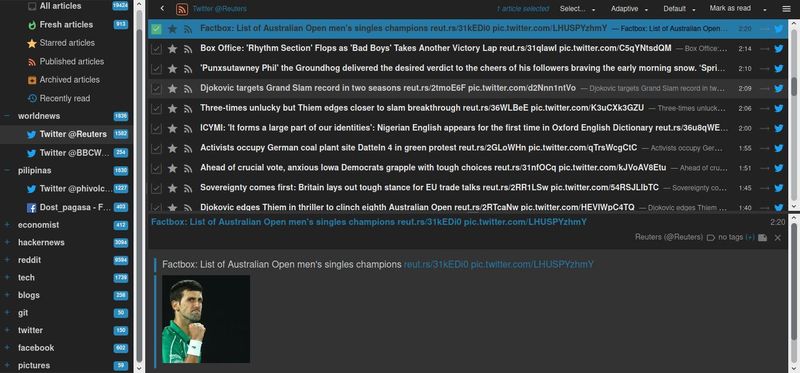Remember Google Reader? There are lots of dead projects in the Google Cemetery. But in my opinion, Google Reader is the one Google product that was killed not for being useless and unpopular but for evil corporate empire reasons. Basically, it was bad for the advertisers.
![]()
Most people do not know what RSS is even though almost everyone uses the technology in some way. It has had many meanings but my preferred one is Really Simple Syndication. It's simply a way to get updates from any website (usually blogs) through a simple address often called a feed URL.
As an example, this blog's feed is: https://code.hopeph.com/atom.xml
You don't really visit a feed in a browser though but you add it as a subscription in a feed reader like Google Reader was. Having a collection of subscriptions would be like browsing through an email inbox showing you the latest headlines from the sites you've subscribed to. No more need to check all your favorite sites one by one. A feed reader can even display articles in a readable format to only show the content minus all the site design often eliminating the advertisements. And that's the power of RSS.
I have not been able to find my Google Reader feeds subscription backup but I've chosen to move on and start afresh. Even back when Google Reader was still alive, I already expressed interest in having my own feed reader. I used Inoreader for quite some time because I liked how it look. There were lots of other web-based alternatives too like Feedly. But all of them relied on someone else's online service.
Of course, there are desktop feed readers too. Some web browsers even have a feed reader feature. But I wanted something that I could use across multiple devices and have the data synchronized among them. For most people, the online feed reader services available are more than enough. And here I shall list some that I recommend.
Online RSS Readers with free services: The Old Reader Inoreader Newsblur
These services have a forever free plan and you only need to pay if you need to subscribe to a ton of feeds or just want to support their service. The average Internet user would find the free service sufficient already. If you're that, you can just skip the next paragraph because it is for those who want to have their own private feed reader independent of any commercial service.

The feed reader, it turns out, was the first online service which I wanted to selfhost. That is why Andrew Dolgov's Tiny Tiny RSS was one of the first Android apps I purchased in the Google Play Store many years ago. It actually remained a wasted purchase for quite a few years because the server part required a lot of maintenance and that was just too much time to spend on getting a feed reader to work. Also, this was before cloud servers like AWS and Azure were a thing. I remember trying to get it to work on a shared hosting server and gave up. Fast-forward to today and getting services like this setup online are now a breeze, relatively.
I seriously can't imagine ever using the Web again without an RSS reader. Gone are the days when sites were quick to load and easy on the eyes.
I use RSS to get updates from public Facebook pages and Twitter profiles. Without seeing the social aspect of likes, reactions and comments, I can assess the quality based purely on the content.
I use RSS to sift through the headlines quickly. News sites these days are designed to maximize clicks and time spent on the page. The ways they come up with just to accomplish these are downright annoying already sometimes. Ads, newsletter popups, and auto-play videos are the most popular annoyances of the new Web of today. With RSS, I can filter headlines and read the stuff which actually matter to me.
Not all sites provide RSS feeds though and there are solutions of course: RSS-Bridge Feed43
I think everyone should be using RSS to read the web. Google Reader's demise had placed RSS back in the shadow but the recent popularity of podcasts has brought it back to the spotlight. RSS will give back the control over web content most users have ceded to AI and machine-learning algorithms. It's an important step away from mindless scrolling in apps and towards critical thinking which ironically, the information-laden Internet of today has made nearly impossible.
Tiny Tiny RSS: https://tt-rss.org/